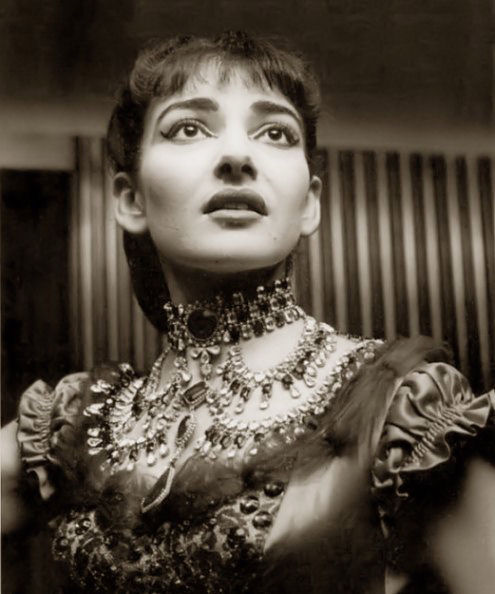The great Callas, according to biographer Richard Levine:
Maria’s impressive willpower and focus enabled her to develop into the artist we think of when we think of Callas, but at the time her fellow students were hardly charmed by her chilly single-mindedness. One of them later said that ‘her earnestness was oppressive.’ Maria knew, however, that is was necessary for her to focus her talent into a light that would outshine everyone else. It was Maria against the world, and she would not share the spotlight. Of course, the anger and alienation that she had long felt were elements of this drive, but as time went on she achieved the calm, regal demeanor for which she would become known. A close friend later revealed, ‘When I was near Maria, her appearance may have been of calm and silence, but if I sat near her quietly, without talking, I never felt calm or silence coming from her. Deep down the turmoil was hidden. On the surface everything was quiet; underneath I felt the volcano getting ready to explode at any minute.’
I like this passage for its highlighting of traits that successful people embody — willpower, focus, single-mindedness, volcanic energy, and so on. But also for its contrasting the genius’s relation to others and the others’ relation to the genius.

Callas early in life ran into those who were uncaring about her talent, unable to recognize it, or obstructionist when they did recognize it. As a result, she developed a generalized attitude of anger and alienation against a world that resisted or opposed her development. But then, as she matured, she strove to rise above the anger, not letting it dictate her reactions, instead focusing her energy positively on becoming how she wanted to be.
Relationships have two sides, and the other side is how those in Callas’s social circle responded to her. Some shared her commitment and admired her talent, and they became friends and associates. But many others were less committed or resented her talent. And it’s striking how the same character trait of one person will generate opposed reactions from others. When a fellow student says, for example, that Callas’s earnestness was “oppressive,” does that tell us more about the student or about Callas?
Related:
Creative geniuses as selfish — Rachmaninoff version.
Creative geniuses as selfish — Richard Wagner version.
Source: Richard Levine, Maria Callas, A Musical Biography (New York: Black Dog and Leventhal, 2003), p. 19.

Maria Callas is the greatest operatic soprano-actress of our age, IN THE ITALIAN REPERTOIRE. The greatest of sopranos, in my view, is KIRSTEN FLAGSTAD. However, as the soprano voice is the most numerous in nature, and the most luscious to the ear, one shouldn’t fuss too much about relative excellence. The list of wonderful sopranos can not be listed here. But I do not think the term “genius” should apply to any performer, only to the CREATIVE GENIUS who composed or wrote the piece being performed. Hence, Shakespeare is a genius, Laurence Olivier is not.
I should also like to add that GENIUS IS STRICTLY A MALE ATTRIBUTE. It takes enormous testosterone and a focused brain to produce ‘works of genius.’ In comparison, women, though hardly “inferior” to men, have a multitasking organ in their lovely crania. This does not gainsay the achievements of brilliant women like AYN RAND or — to pick just one other novelist — EMILY BRONTE. Let’s not forget JANE AUSTEN. The greatest woman critic who ever lived (in my perverse sensibility) is EDITH HAMILTON. If you have not read THE GREEK WAY you are only on first base when it comes to Western Culture. I also recommend THE ROMAN WAY (and heed carefully Edith’s intro).
Most of the “brilliant” women we know are childless or unmarried. The spinster lady who knows it all. To be a genius means to roll with all the punches, not just the household niceties. The world is a man’s place, the home and hearth, a woman’s. Many will object that “women are out there doing all kinds of cool things,” but they are not doing anything not already accomplished by men. Indeed, the burn-out level of women as CEOs is enormous. Women seem to make money in the Martha Stewart and Mary K environment, selling women what women REALLY want.
It is significant that Maria Callas’ career was destroyed by a man, Aristotle Onassis, one of the slimiest blackguards in European business history. He bought liberty ships and sank them (killing many Greek sailors) and collected the insurance money. He also seduced Maria Callas from her art, and then, dumped her for the far less sensual Jacqueline Kennedy, a bag of bones.
QED
Thanks Archie Bunker for sharing your sadly esoteric and archaic viewpoint. Yawn.